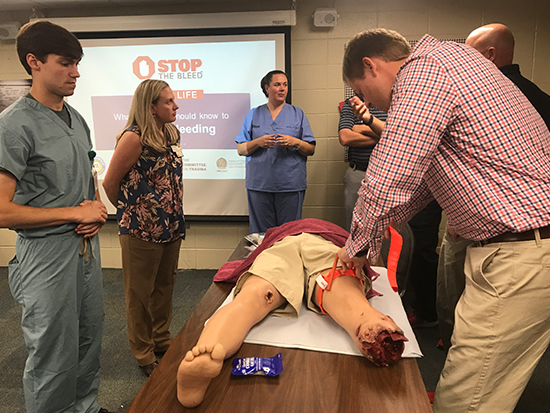 May is Stop the Bleed Month, and the University of Alabama at Birmingham Division of Acute Care Surgery will host three training sessions at UAB Hospital for employees.
May is Stop the Bleed Month, and the University of Alabama at Birmingham Division of Acute Care Surgery will host three training sessions at UAB Hospital for employees.
Stop the Bleed is a campaign organized by the American College of Surgeons and Hartford Consensus to provide training in bleeding-control techniques for the public.
“First responders can’t get to all the victims to provide first aid if a shooter is still loose and the scene is on lockdown,” said chief trauma surgeon Jeffrey Kerby, M.D., Ph.D. “After-action reports of recent mass-shooting events indicate that some of the victims might have survived if bleeding-control techniques had been performed quickly. In the absence of first responders, that responsibility may fall on bystanders. A person can die from uncontrolled bleeding in a matter of minutes.
Stop the Bleed aims to provide the general public with the knowledge and tools to respond quickly in the event of an emergency. It is modeled after the very successful efforts to place AEDs — automated external defibrillators — in public places.
“Ideally, we’d like to see Stop the Bleed kits in courthouses, schools, theaters, stadiums and other public places just as we are now accustomed to seeing AEDs,” Kerby said. “And we need to provide training to the general public in the use of bleeding-control techniques.”
The UAB classes will be in the West Pavilion Conference Center:
- Wednesday, May 8, 10 a.m.
- Wednesday, May 15, 2 p.m.
- Thursday, May 23, 2 p.m.
The tourniquet kits consist of a web and Velcro tourniquet with a windlass for tightening, along with gauze to pack a wound, gloves and basic instructions on bleeding control. The kits cost about $60. Kerby says he has trauma surgeons, nurses and emergency medical technicians ready to provide training; but he is missing one thing: more kits.